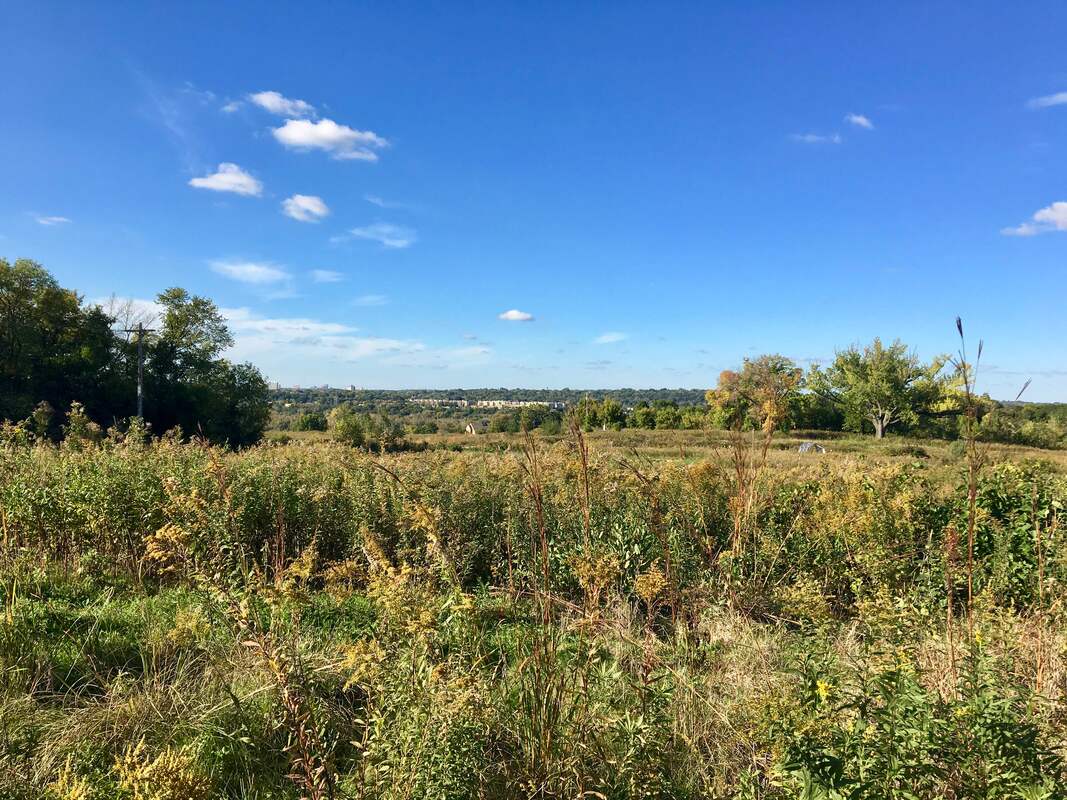|
Erika Sanders, Beloved Community Staff Team UPDATE This fall, in worship, programming, and Sacred Sites Tours, Unity Church has sought to better understand the history experienced by indigenous people in Minnesota and how it lives on in the present day. We have been called into a “season of lament” over the deep suffering in those stories. Two brief video messages from the Rev. Jim Bear Jacobs, shared in our October 18 worship service, “Moving at the Speed of Trust,” are now available online: If you are interested in joining the continuing conversation about how we stay present to this lament while deepening our congregational commitment to Indigenous justice and reparations, contact Karen Hering at [email protected]. Imagine stepping into a story. Maybe telling it, maybe listening to it, but definitely being surrounded by the story, in a physical sense, so that it is fully alive to your senses.
This was the experience of two Sacred Sites tours led by Rev. Jim Bear Jacobs, Director of Racial Justice for the MN Council of Churches, for Unity congregants this autumn. We visited three local sites sacred to Dakota people and listened to the stories embedded there. Rev. Jacobs explained that Dakota stories are not linked to a distant time, but to a place. Dakota stories are alive in the present moment, because they live in the physical spaces around us. As groups stood on a bluff above Bdote, the confluence of the Minnesota and Mississippi Rivers, we heard a genesis story about the origin of the Dakota people. When we visited Fort Snelling State Park at Bdote, the site of the first sacred land stolen from the Dakota and of an internment camp following the Dakota-U.S. War, we heard the voices of the more than 1600 men, women and children who were imprisoned there, sick and starving. At Pilot Knob Hill, once a traditional burial ground before its desecration, we felt the sacred power of land imbued with the essence of honored human spirits. The storytelling experience at each site also included time for silence and contemplation; in these moments, the listener was granted the opportunity to integrate the story into their own freshened understanding of the land on which we live. Rev. Jacobs tells us that despite—and because of—the trauma experienced by Native people, stories have the power to heal both teller and listener because they “make invisible pain visible,” and because with the “sharing and retelling of old traumatic stories, we can create new positive ones.” The stories of the Dakota may sometimes hold terrible pain, but the telling of them may lead to repair, as well. As our congregation works for racial healing and liberation within, among and beyond our walls, these are stories we must hear. To participate in considering Unity’s next steps in beginning this journey, you are invited to join us online, Tuesday, November 17, 7:00-8:30 p.m., for “Indigenous Justice and Reparations Conversation” Rev. Jim Bear Jacobs created Healing Minnesota Stories in 2011. Learn more about Healing Minnesota Stories on the MN Council of Churches website here: https://www.mnchurches.org/what-we-do/healing-minnesota-stories The worship service on October 18, 2020, Moving at the Speed of Trust, explores the broken trust between indigenous peoples and white settlers who claimed the land, and includes reflections from Rev. Jacobs shared during the tour. View the service on the Unity Church-Unitarian You Tube Channel here: https://youtu.be/vCzs9T0zUV0 Read or sign up to follow the Healing Minnesota Stories blog by email here: https://healingmnstories.wordpress.com/
0 Comments
Leave a Reply. |
Topics
All
Beloved Community ResourcesUnity Justice Database
Team Dynamics House of Intersectionality Anti-Racism Resources in the Unity Libraries Collection Creative Writers of Color in Unity Libraries The History of Race Relations and Unity Church, 1850-2005 Archives
July 2024
Beloved Community Staff TeamThe Beloved Community Staff Team (BCST) strengthens and coordinates Unity’s antiracism and multicultural work, and provides opportunities for congregants and the church to grow into greater intercultural competency. We help the congregation ground itself in the understanding of antiracism and multiculturalism as a core part of faith formation. We support Unity’s efforts to expand our collective capacity to imagine and build the Beloved Community. Here, we share the stories of this journey — the struggles, the questions, and the collaborations — both at Unity and in the wider world.
The current members of the Beloved Community Staff Team include Rev. Kathleen Rolenz, Rev. KP Hong, Rev. Lara Cowtan, Drew Danielson, Laura Park, Lia Rivamonte and Angela Wilcox. |
